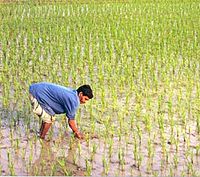
Photo from wikipedia
BACKGROUND An irrigation regime is an important factor in regulating soil CO2 emissions from wheat fields. Deficit irrigation can be applied easily in the fields and has been implemented in… Click to show full abstract
BACKGROUND An irrigation regime is an important factor in regulating soil CO2 emissions from wheat fields. Deficit irrigation can be applied easily in the fields and has been implemented in northwest China. Previous studies have mainly focused on the effects of deficit irrigation on crop yield and quality. Studies on its environmental impacts are sparse. RESULTS Soil CO2 fluxes from deficit-irrigated fields were lower than those from full irrigation (CK) during most of the growing season. Cumulative soil CO2 emissions from deficit-irrigated fields were reduced by 10.2-25.5%, compared with the CK. Peaks of soil CO2 fluxes were observed 3-7 days after irrigation in the water-filled pore space (WFPS) range of 65.7-80.4%. Under different irrigation regimes, significant positive correlations were observed between soil CO2 fluxes and WFPS (P < 0.01), but no significant correlations were found between soil CO2 fluxes and soil temperature. Compared to CK, yields for the T1, T2, and T4 were significantly reduced (P < 0.05) but the yield for T3 was only reduced by 2.3% (P > 0.05); T3 significantly reduced soil CO2 emissions by 10.2% (P < 0.05) and reduced the irrigation water amount by 5.7%. CONCLUSION Deficit irrigation effectively reduced CO2 emissions from winter wheat field soils. T3 may be a water-saving, CO2 emission-reducing and high-yield irrigation regime for winter wheat fields in northwest China. The research laid a preliminary theoretical foundation for formulating winter wheat irrigation systems that are water saving, emission reducing, and that produce high yields. © 2019 Society of Chemical Industry.
Journal Title: Journal of the science of food and agriculture
Year Published: 2019
Link to full text (if available)
Share on Social Media: Sign Up to like & get
recommendations!